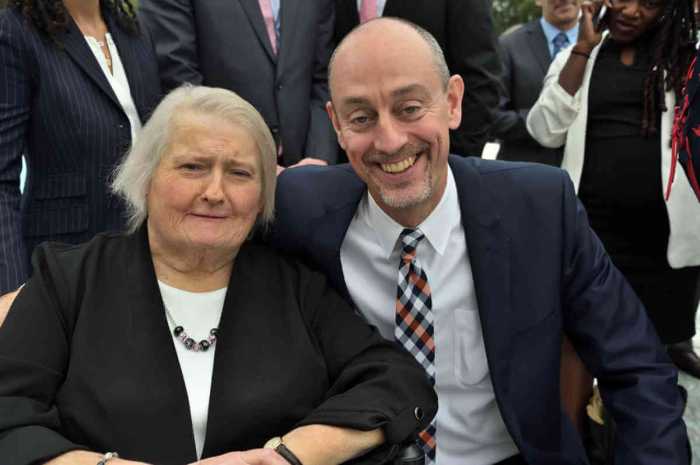A group of former Trump administration officials formed a right-wing litigation group in February 2021, called America First Legal Foundation, for the purpose of attacking Biden Administration policies. Their litigation has targeted southern border policy, education policy, and the Biden Administration’s determination to use the Supreme Court’s 2020 decision in Bostock v. Clayton County to protect LGBTQ people from discrimination under federal law.
The group was created by former Senior Trump White House Advisor Stephen Miller and former Trump administration Counselor to the Attorney General Gene Hamilton. Other Trump administration officials joined the board of America First, including former White House Chief of Staff Mark Meadows, former Acting Attorney General Matthew Whitaker, and former Director of the Office of Management and Budget Russ Vought.
One of the main goals of the Trump administration, collaborating closely with then-Senate Majority Leader Mitch McConnell and Judiciary Committee Chair Chuck Grassley, was to pack the federal courts with right-wing judges associated with the Federalist Society and approved by the Heritage Foundation. High on that list was Matthew J. Kacsmaryk, whose nomination by Trump to be a federal district judge in Texas was so controversial that he had to be renominated twice before the Senate would confirm him.
A graduate of Abilene Christian University and the University of Texas Law School, Kasmaryk joined the Federalist Society in 2012 and served as deputy general counsel to First Liberty Institute, which considers freedom of religion to be the “first liberty” protected by the Constitution, and litigates extensively to broaden the rights of religious observers to avoid complying with anti-discrimination laws.
LGBTQ rights groups opposed Trump’s nomination of Kacsmaryk in 2017, citing his published statements referring to homosexuality as “disordered” and contending that being transgender is a “delusion” and a “mental disorder.” He stated opposition to Roe v. Wade, of course, as well as the Supreme Court’s rulings protecting sex outside of marriage. LGBTQ rights groups argued that his background precluded his being able to preside impartially on cases involving LGBTQ issues.
Kacsmaryk’s nomination failed to move to the Senate floor during that session. Trump renominated him in 2018, but again his nomination failed to move to a Senate vote. Trump nominated him again in 2019, when he was reported out of the Judiciary Committee on a party-line vote and then confirmed on a party-line vote. He was assigned to preside as the only federal judge in the district court in Amarillo, Texas. Any lawsuit filed in Amarillo will come before him.
During the last year of the Trump Administration, the Supreme Court decided Bostock v. Clayton County in June 2020. This was a consolidation of three LGBTQ employment discrimination cases, holding that under Title VII of the Civil Rights Act of 1964, anti-LGBTQ discrimination is a violation of the provision banning discrimination “because of sex.” Writing for the court, President Trump’s first Supreme Court appointee, Justice Neil Gorsuch, wrote that it is impossible for an employer to discriminate against a person because of their sexual orientation or transgender status without taking account of their sex, thus bringing such claims within the scope of the statute.
Although Gorsuch’s opinion focused narrowly on interpretation of Title VII, its reasoning seemed to clearly apply to any law that bans sex discrimination, and the incoming Biden Administration adopted that view, first in an executive order signed by President Biden on his first day in office, and then in policy statements, guidelines, and litigation undertaken by various federal departments. This directly contradicted the views of the Trump administration, which took the position that Bostock applied only to Title VII employment discrimination cases. The outgoing administration issued a statement to that effect just days before leaving office.
Challenging the Biden administration’s view of Bostock is high on Miller’s hit list. America First found some doctors to be its plaintiffs and filed a lawsuit in Judge Kacsmaryk’s court, suing Health and Human Services (HHS) Secretary Xavier Becerra and the federal government on a claim that the Bostock ruling does not apply to Section 1557 of the Affordable Care Act and by cross-reference to Title IX of the Education Amendments of 1972.
Title IX, passed a few years after Title VII, provides that educational institutions that receive federal funding may not discriminate “on the basis of sex.” The Obama administration took the position that this extended to sexual orientation and gender identity claims, a position disavowed by the Trump Administration. Section 1557 provides that health care providers and insurers may not discriminate on grounds identified in a list of federal statutes that includes Title IX. Thus, if Title IX bans sexual orientation and gender identity discrimination, so does Section 1557.
Can one imagine a more egregious case of “forum-shopping” than this lawsuit? The suit was filed in Amarillo, where the only federal judge is a person whose nomination was loudly opposed by LGBTQ rights groups because of his openly expressed anti-LGBT views. The case is being defended by the Civil Division of the Justice Department and the US Attorney’s Office in Dallas.
A judge with a record of outspoken anti-LGBTQ views who was concerned about the appearance of bias or impartiality would voluntarily recuse himself from this case, but not Kacsmaryk, and the Justice Department has not moved for his recusal. Instead, it filed a motion to dismiss the case, arguing that the three doctor plaintiffs do not have standing to bring it, and that in any event the precedent of Bostock clearly applies to support the Biden administration’s position that Section 1557 and Title IX extend to gender identity discrimination, which is the main focus of the lawsuit.
The plaintiffs, doctors practicing in Texas and California, claim that they provide health care to transgender minors and have prescribed gender-affirming treatment in the past, but that they do not support such treatment for every patient claiming to be transgender, and that they don’t support gender-affirming surgery for minors. They claim to fear being sued or prosecuted under Section 1557 if they refuse to provide treatments that they believe to be unsuitable for their patients. They argue that their ethical duty is to provide treatment consistent with a patient’s sex assigned at birth, regardless of their gender identity, and, echoing Republican legislators in Texas and elsewhere who are opposed to any gender-affirming treatment for minors, that they should not be required to provide treatment that violates their professional ethical views.
One example they give of the ethical dilemma posed by the HHS rule is of a transgender woman who refuses to submit to treatment for prostate cancer, because of her insistence that because she identifies as a woman, she does not have a prostate. This is fairly ridiculous and it is hard to see how a doctor who insisted on having their transgender patient submit to examination for possible prostate cancer stands any risk of being prosecuted by HHS or sued under Section 1557.
The government argued that none of these doctors had been prosecuted or sued on any of the theories they raised and that there is no looming threat of prosecution, so they do not have standing to bring a proactive challenge to the administration’s interpretation. The judge disagreed, pointing out that a “notification” sent to health care providers by HHS said that the department “will interpret and enforce” Section 1557 as applying to sexual orientation and gender identity claims which, he wrote, “directly implicates Plaintiffs’ treatment or non-treatment of transgender patients as pled in their complaint.”
Because the question whether Section 1557 (derivative of Title IX) applies to such claims is a question of law, the court found it “ripe” for judicial review, opining that there was no need to wait for HHS to move against a health care provider in order for the issue to be resolved by the courts. Implicit in this is that HHS would likely pursue enforcement in a district court where a doctor had refused treatment, not in a district especially chosen by America First for a judge likely to have a predisposition towards the challengers of HHS’s interpretation of the statute.
As to the application of Bostock, after noting Justice Gorsuch’s opinion stating the court was only deciding the question under Title VII, Judge Kacsmaryk zeroed in on differences in language between Title VII and Title IX. Title VII prohibits discrimination “because of the … sex” of the plaintiff. Title IX, by contrast, refers to discrimination “on the basis of sex.” Somebody disposed to distinguish between the two statutes could argue that the “but for” discriminatory intent of Title VII did not apply to Title IX, since “on the basis of sex” could be construed to mean “solely” because of the individual’s sex assigned at birth. Judge Kacsmaryk also noted various provisions of Title IX that he asserted reflected a binary view of sex inconsistent with claims of gender identity.
America First tailored its complaint to support this argument. Judge Kacsmaryk wrote, “The question of whether Bostock’s reasoning applied to Section 1557 remains unsettled — at least in the Fifth Circuit. That is the question Plaintiffs ask this court to answer.” And the plaintiffs claimed that under Section 1557, the various situations they alleged in their complaint “do not violate Section 1557’s prohibition on ‘sex’ discrimination because Plaintiffs ‘would have acted in the exact same manner if the patient had been a member of the opposite biological sex’ – consistent with Bostock, notwithstanding [sexual orientation and gender identity].”
The judge concluded that “the pure question of law remains unanswered: Does Bostock prohibit [sexual orientation and gender identity] discrimination under the Section 1557 definition of ‘sex’ — or does Bostock permit [such] discrimination if the healthcare provider ‘would have acted in the exact same manner if the patient had been a member of the opposite biological sex?” Thus, the judge refused to dismiss the case.
America First chose their judge, situated in one of the most conservative of the federal circuits: the Fifth (Texas, Louisiana, Mississippi), where LGBT rights claims go to die. And, of course, they are confident that the Supreme Court, as presently constituted, is likely to approve whatever resolution of these questions Judge Kacsmaryk and the Fifth Circuit might reach. Here is yet another reason why enactment of the Equality Act, which would add sexual orientation and gender identity to the list of prohibited grounds of discrimination throughout federal statutes, remains so important. It is not enough to protect LGBT rights to win an interpretive ruling from the Supreme Court under one statute, leaving it open to conservative federal judges to construe that ruling narrowly and refuse to extend its reasoning to other federal laws.


































